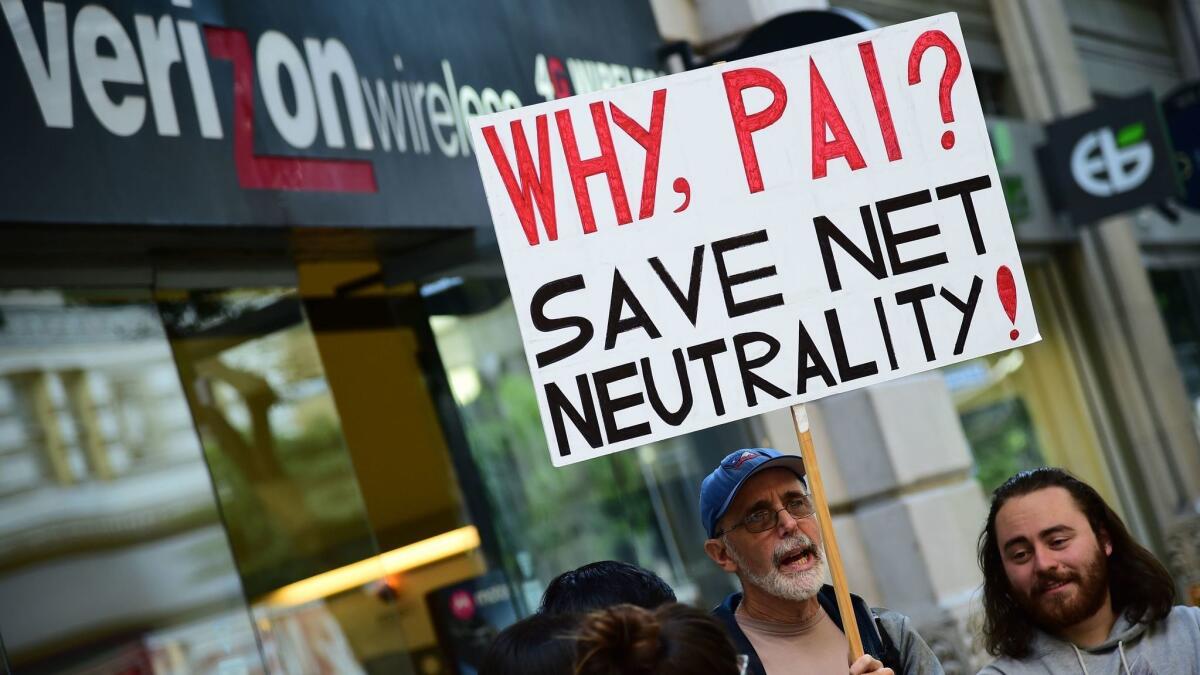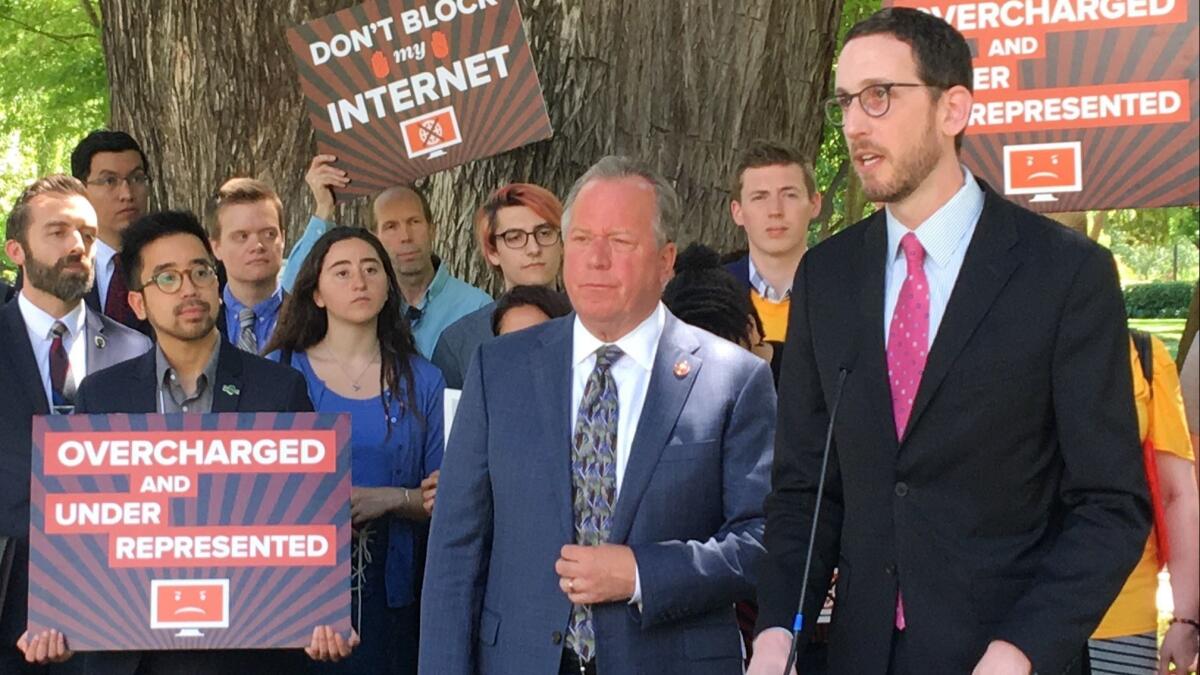California pledged to protect net neutrality — the showdown is here

- Share via
Reporting from Sacramento — When federal regulators voted late last year to roll back net neutrality protections, state Democratic leaders pledged to wage a fight with the Trump administration to preserve fair and open access to the internet in California.
Now two bills facing final approval in the Assembly and Senate this week have become a proxy battle in the larger national fight to reshape the internet.
The ambitious proposals would establish the strongest net neutrality rules in the nation, safeguards that advocates say would be stronger than those rejected by the White House. One would prevent internet service providers from blocking or slowing down websites and video streams, or charging websites fees for faster speeds. The other would deny public contracts to companies that fail to follow the new state regulations.
Calls in support of the legislation intensified last week after news broke that Santa Clara County firefighters were hindered by inadequate internet service as they helped battle the massive Mendocino Complex fire in July.
But pushing the bills through to passage hasn’t been as easy as proponents had hoped in a state controlled by Democrats with a distaste for Trump administration policies. Over the past year, a powerful tech industry has sunk millions into killing the state’s net neutrality efforts, while supporters have responded in kind with aggressive public advocacy campaigns.
“Everyone is waiting to see what happens with this bill,” Evan Greer with the tech advocacy nonprofit Fight for the Future said of the proposal to bar ISPs from slowing access or charging fees for faster speeds. “If California can’t pass net neutrality protections, opponents will use it as fodder to kill any net neutrality efforts at the federal level moving forward .… if the bill passes, it would create the gold standard for other states to follow suit.”
Net neutrality has been the most closely watched telecom issue taken up by the Federal Communications Commission over the past decade. The most recent rules were implemented in a Februrary 2015 order under the Obama administration. They barred broadband and wireless companies such as AT&T Inc. and Verizon Communications from selling faster delivery of some data, slowing speeds for certain content or favoring selected websites over others.
But the federal agency voted to reverse the regulations last year, with President Trump-appointed FCC Chairman Ajit Pai and Republicans calling for an end to the utility-like oversight of internet service providers. The vote and the official repeal of the rules in June sparked protests across the state and nationwide.
Net neutrality has since become a rallying issue for Democrats to stir young voters in House races across the country, though opposition to the rollback of the rules has remained overwhelmingly bipartisan. A March survey of 997 registered voters by the School of Public Policy at the University of Maryland found 82% of Republicans and 90% of Democrats were against the move.
With that national conversation as a backdrop, California is one of 29 states that have since considered net neutrality protections in the last year. Governors in six states — including Hawaii, New York and Montana — have signed executive orders to reinstate some form of net neutrality. Three states — Oregon, Vermont and Washington — passed legislation to ensure such protections for government agencies and consumers.
State Sens. Scott Wiener (D-San Francisco) and Kevin de León (D-Los Angeles) are working together to establish rules that go beyond those adopted under the Obama administration. Wiener’s Senate Bill 822 would, in effect, re-establish the Obama-era rules. Senate Bill 460 by De León bars companies that violate them from receiving public dollars.
But SB 822 also places new limits on zero-rated data plans, or package deals that allow companies such as Verizon or Comcast to exempt some calls, texts or other content from counting against a customer’s data plan. Unlimited phone plans that give customers “free nights and weekends” would be permitted. Data plans that exempt the same type of content from some companies over others — video streamed on YouTube but not Hulu, for example — would not.
The bill also prohibits broadband companies from evading net neutrality rules not only as data travels through their networks, but as it enters them. That would prevent internet service providers from slowing down content from websites that refuse to pay for delivering the data to their customers.
Neither issue was fully addressed in the 2015 federal net neutrality order, which allowed the FCC to further study zero-rated data plans and internet traffic exchange practices “without adopting prescriptive rules.”
But proponents — including former FCC Chairman Tom Wheeler, who was appointed by President Obama, and smaller to mid-level broadband companies — argue the state legislation mostly mirrors the 2015 order in language and approach, tasking the state attorney general with evaluating potential violations on a case-by-case basis. Former FCC officials say the new limits on zero-rated data plans are based on policy analysis that the federal agency undertook in 2016.
Meanwhile, state lawmakers paint a grim picture of the internet without net neutrality rules. They say providers would be able to sell bundled packages with only select sports, entertainment and shopping sites for consumers, or slow readers’ access to news sites that refuse to pay more for faster service. Start-ups would suffer.
SB 822 would ensure “that we all get to decide for ourselves where we go on the internet, as opposed to having internet service providers tell us where we are allowed to go,” Wiener said.

High-profile court cases have underscored their concerns. From 2013 until the 2015 order, six major ISPs were accused of slowing down content from companies that refused to pay for access to their customers. Troubles with Netflix made the most headlines as customers experienced delays watching movies and TV shows.
Many more companies felt the the impact, said Stanford Law School professor Barbara van Schewick, who has studied the issue for more than a decade.
“Employees couldn’t connect to their company’s network,” she said. “Schools couldn’t upload their payload data. Skype calls dropped.”
But major telecom companies and broadband service providers contend the state legislation reaches far beyond the scope of the rolled back federal regulations. Tech industry lobbyists say the rules could lead to costly litigation against the state, and would create a patchwork of state and federal laws governing the internet.
“There are a bunch of folks that didn’t get what they wanted in the 2015 order and are trying to get it here in California,” Steve Carlson, general counsel for the Computing Technology Industry Assn., said at a recent committee hearing.
Bill Devine, a Sacramento-based lobbyist for AT&T, has suggested Wiener’s bill would hurt tech innovation and last week called it “a radical departure from historical internet policy.”
“We believe this bill is anti-competitive and anti-consumer, and is surely going to be challenged,” he said.
The debate in California has drawn national attention. When the Assembly Communications and Conveyance Committee tried to scale back SB 822 in June, it retreated amid backlash from net neutrality proponents. The committee’s chairman, Assemblyman Miguel Santiago (D-Los Angeles), faced a barrage of tweets condemning the move, and his committee’s vote was captured in a video that went viral. Some took family photos from Santiago’s social media profiles and used them to create critical memes.
Fight for the Future raised more than $15,000 through a crowdfunding site and Reddit campaigns to put a billboard in Santiago’s district urging him to restore the bill. On Friday, Santiago said the committee had always intended to keep working on the legislation, and called claims that members tried to rewrite it at the behest of the tech industry false.
“At the end of the day, the proof is in the pudding,” said Santiago, who has signed on as a co-author to both bills. “We put together the strongest net neutrality bill in the country. The tech industry opposed it then, it opposes it now — and they will continue to oppose it. But I feel good about our chances.”
The bills passed out of his committee last week, hours after Verizon was reported to have slowed the speed of the Santa Clara Fire Department’s wireless data transmission. The revelation was detailed in an addendum to a federal lawsuit filed by states including California to challenge the repeal of net neutrality rules.
Verizon general counsel Heidi Barsuglia called it a customer service mistake and said the company was investigating the incident.
“This particular situation has nothing to do with net neutrality,” she told lawmakers. “Net neutrality addresses content discrimination. This was content neutral.”
But Assemblyman Freddie Rodriguez (D-Pomona) wondered what could happen to consumers without protections if even firefighters could face difficulty accessing the internet while “protecting our people and saving lives.”
Wiener said that at the very least it was evidence of “how critical internet access is to everything.”
More stories from Jazmine Ulloa »
More to Read
Get the L.A. Times Politics newsletter
Deeply reported insights into legislation, politics and policy from Sacramento, Washington and beyond. In your inbox twice per week.
You may occasionally receive promotional content from the Los Angeles Times.











